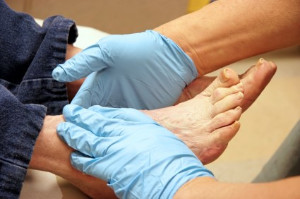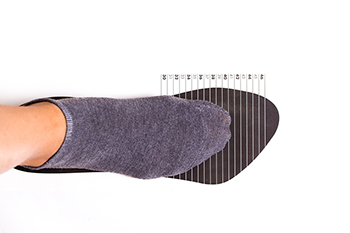Items filtered by date: January 2025
Managing Diabetic Foot Issues

Diabetic foot issues are a frequent complication of diabetes, often caused by poor circulation and nerve damage. These problems typically result from persistently high blood sugar levels. Symptoms can include numbness, tingling, pain, or a loss of sensation in the feet, as well as slow-healing cuts or sores. Without proper care, these issues can lead to serious infections or even amputations. The primary causes of diabetic foot problems include nerve damage, which makes it harder to feel injuries, and reduced blood flow, which impairs healing. Poor foot hygiene, wearing ill-fitting shoes, and untreated infections can also contribute. Treatment varies but often involves managing blood sugar levels, cleaning and dressing wounds, and wearing properly fitted shoes. A podiatrist may recommend custom orthotics, wound care, or even surgical interventions in severe cases to prevent further complications. If you are have diabetes, it is strongly suggested that you are under the care of a podiatrist who can help you to manage this serious condition.
Diabetic foot care is important in preventing foot ailments such as ulcers. If you are suffering from diabetes or have any other concerns about your feet, contact Afsaneh Latifi, DPM from Lenox Hill Podiatry. Our doctor can provide the care you need to keep you pain-free and on your feet.
Diabetic Foot Care
Diabetes affects millions of people every year. The condition can damage blood vessels in many parts of the body, especially the feet. Because of this, taking care of your feet is essential if you have diabetes, and having a podiatrist help monitor your foot health is highly recommended.
The Importance of Caring for Your Feet
- Routinely inspect your feet for bruises or sores.
- Wear socks that fit your feet comfortably.
- Wear comfortable shoes that provide adequate support.
Patients with diabetes should have their doctor monitor their blood levels, as blood sugar levels play such a huge role in diabetic care. Monitoring these levels on a regular basis is highly advised.
It is always best to inform your healthcare professional of any concerns you may have regarding your feet, especially for diabetic patients. Early treatment and routine foot examinations are keys to maintaining proper health, especially because severe complications can arise if proper treatment is not applied.
If you have any questions please feel free to contact our office located in New York, NY . We offer the newest diagnostic and treatment technologies for all your foot and ankle needs.
How to Measure Your Shoe Size for a Proper Fit

Finding the right shoe size is essential for comfort and foot health. To measure your shoe size accurately, begin by standing on a piece of paper with your heel against a wall. Using a pencil, mark the longest part of your foot, usually the tip of your toe. Then, measure the distance from the wall to the mark you made. This measurement will give you the length of your foot. It is also important to measure the width of your foot by placing the tape or ruler around the widest part, typically near the ball of the foot. Ensure that you measure both feet, as one foot may be slightly larger than the other. Once you have these measurements, consult a shoe size chart to determine your correct size. If you have developed foot pain from wearing shoes that do not fit correctly, it is suggested that you consult a podiatrist who can treat various foot conditions, and educate you on the importance of wearing shoes that fit properly.
It is important to find shoes that fit you properly in order to avoid a variety of different foot problems. For more information about treatment, contact Afsaneh Latifi, DPM from Lenox Hill Podiatry. Our doctor will treat your foot and ankle needs.
Proper Shoe Fitting
Shoes have many different functions. They cushion our body weight, protect our feet, and allow us to safely play sports. You should always make sure that the shoes you wear fit you properly in order to avoid injuries and deformities such as: bunions, corns, calluses, hammertoes, plantar fasciitis, stress fractures, and more. It is important to note that although a certain pair of shoes might be a great fit for someone else, that doesn’t mean they will be a great fit for you. This is why you should always try on shoes before buying them to make sure they are worth the investment. Typically, shoes need to be replaced ever six months to one year of regular use.
Tips for Proper Shoe Fitting
- Select a shoe that is shaped like your foot
- Don’t buy shoes that fit too tight, expecting them to stretch to fit
- Make sure there is enough space (3/8” to ½”) for your longest toe at the end of each shoe when you are standing up
- Walk in the shoes to make sure they fit and feel right
- Don’t select shoes by the size marked inside the shoe, but by how the shoe fits your foot
The shoes you buy should always feel as good as they look. Shoes that fit properly will last longer, feel better, and improve your way of life each day.
If you have any questions, please feel free to contact our office located in New York, NY . We offer the newest diagnostic and treatment technologies for all your foot care needs.
Are You Suffering From Nerve Damage?
The Benefits of Wearing the Right Shoes at Work

Wearing the right shoes while working is essential for maintaining comfort and preventing injuries. Proper footwear supports the natural alignment of the feet, reducing strain on the legs, back, and joints. This can help prevent foot pain, blisters, and conditions like plantar fasciitis. In addition, the right shoes improve posture, enhancing overall energy levels and productivity throughout the day. For individuals who spend long hours on their feet, the right shoes provide cushioning and support that alleviate pressure, ensuring workers stay comfortable, healthy, and focused. Investing in quality footwear is important in promoting well-being and improving job performance. If you have sustained a foot injury during the workday, it is suggested that you consult a podiatrist who can treat various foot conditions and guide you on appropriate shoes for your workday.
While working on the feet, it is important to take the proper care of them. For more information about working on your feet, contact Afsaneh Latifi, DPM from Lenox Hill Podiatry. Our doctor will treat your foot and ankle needs.
Working on Your Feet
Standing on your feet for long periods of time can cause stress and pain in your feet. Your whole body may experience change in terms of posture, back pain, bunions, callouses and or plantar warts. There are ways to avoid these conditions with proper foot care, smart choices and correct posture.
Positive Changes
Negative heeled shoe – Choosing this shoe type places the heel slightly lower than the ball of the foot. These are great for overall foot health. Find shoes that fit you correctly.
Go barefoot – Our feet were not designed to be enclosed for all hours of the day. Try to periodically expose your feet to air.
Eliminate Pain
Foot Exercises – Performing simple exercises, incorporating yoga and doing stretches are beneficial. This will allow increased blood flow to the area and muscles of the foot.
Achilles tendon – Stretching the foot out flat on the floor will relax the calf muscles and tendon. These exercises can be performed almost anywhere. Make sure you add these exercises to your daily regimen.
With a little bit of this information and knowing more about foot health, you will notice changes. Foot stretches and proper footwear will help with pain and prevent further issues.
If you have any questions please feel free to contact our office located in New York, NY . We offer the newest diagnostic and treatment technologies for all your foot and ankle needs.





